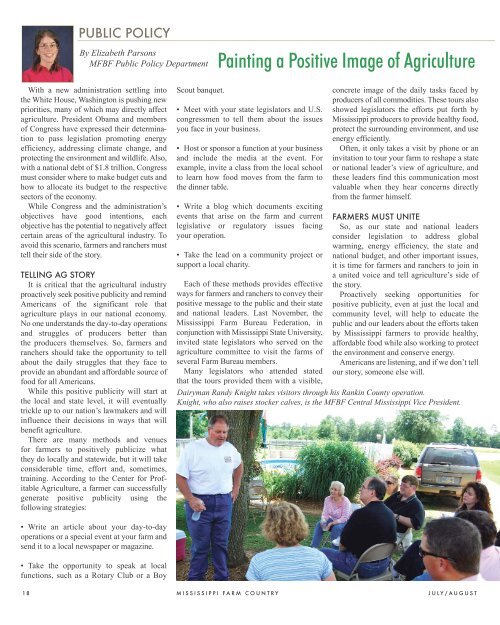July/August-09:Layout 1 - Mississippi Farm Bureau Federation
July/August-09:Layout 1 - Mississippi Farm Bureau Federation
July/August-09:Layout 1 - Mississippi Farm Bureau Federation
You also want an ePaper? Increase the reach of your titles
YUMPU automatically turns print PDFs into web optimized ePapers that Google loves.
PUBLIC POLICY<br />
By Elizabeth Parsons<br />
MFBF Public Policy Department Painting a Positive Image of Agriculture<br />
With a new administration settling into<br />
the White House, Washington is pushing new<br />
priorities, many of which may directly affect<br />
agriculture. President Obama and members<br />
of Congress have expressed their determination<br />
to pass legislation promoting energy<br />
efficiency, addressing climate change, and<br />
protecting the environment and wildlife. Also,<br />
with a national debt of $1.8 trillion, Congress<br />
must consider where to make budget cuts and<br />
how to allocate its budget to the respective<br />
sectors of the economy.<br />
While Congress and the administration’s<br />
objectives have good intentions, each<br />
objective has the potential to negatively affect<br />
certain areas of the agricultural industry. To<br />
avoid this scenario, farmers and ranchers must<br />
tell their side of the story.<br />
TELLING AG STORY<br />
It is critical that the agricultural industry<br />
proactively seek positive publicity and remind<br />
Americans of the significant role that<br />
agriculture plays in our national economy.<br />
No one understands the day-to-day operations<br />
and struggles of producers better than<br />
the producers themselves. So, farmers and<br />
ranchers should take the opportunity to tell<br />
about the daily struggles that they face to<br />
provide an abundant and affordable source of<br />
food for all Americans.<br />
While this positive publicity will start at<br />
the local and state level, it will eventually<br />
trickle up to our nation’s lawmakers and will<br />
influence their decisions in ways that will<br />
benefit agriculture.<br />
There are many methods and venues<br />
for farmers to positively publicize what<br />
they do locally and statewide, but it will take<br />
considerable time, effort and, sometimes,<br />
training. According to the Center for Profitable<br />
Agriculture, a farmer can successfully<br />
generate positive publicity using the<br />
following strategies:<br />
• Write an article about your day-to-day<br />
operations or a special event at your farm and<br />
send it to a local newspaper or magazine.<br />
• Take the opportunity to speak at local<br />
functions, such as a Rotary Club or a Boy<br />
Scout banquet.<br />
• Meet with your state legislators and U.S.<br />
congressmen to tell them about the issues<br />
you face in your business.<br />
• Host or sponsor a function at your business<br />
and include the media at the event. For<br />
example, invite a class from the local school<br />
to learn how food moves from the farm to<br />
the dinner table.<br />
• Write a blog which documents exciting<br />
events that arise on the farm and current<br />
legislative or regulatory issues facing<br />
your operation.<br />
• Take the lead on a community project or<br />
support a local charity.<br />
Each of these methods provides effective<br />
ways for farmers and ranchers to convey their<br />
positive message to the public and their state<br />
and national leaders. Last November, the<br />
<strong>Mississippi</strong> <strong>Farm</strong> <strong>Bureau</strong> <strong>Federation</strong>, in<br />
conjunction with <strong>Mississippi</strong> State University,<br />
invited state legislators who served on the<br />
agriculture committee to visit the farms of<br />
several <strong>Farm</strong> <strong>Bureau</strong> members.<br />
Many legislators who attended stated<br />
that the tours provided them with a visible,<br />
concrete image of the daily tasks faced by<br />
producers of all commodities. These tours also<br />
showed legislators the efforts put forth by<br />
<strong>Mississippi</strong> producers to provide healthy food,<br />
protect the surrounding environment, and use<br />
energy efficiently.<br />
Often, it only takes a visit by phone or an<br />
invitation to tour your farm to reshape a state<br />
or national leader’s view of agriculture, and<br />
these leaders find this communication most<br />
valuable when they hear concerns directly<br />
from the farmer himself.<br />
FARMERS MUST UNITE<br />
So, as our state and national leaders<br />
consider legislation to address global<br />
warming, energy efficiency, the state and<br />
national budget, and other important issues,<br />
it is time for farmers and ranchers to join in<br />
a united voice and tell agriculture’s side of<br />
the story.<br />
Proactively seeking opportunities for<br />
positive publicity, even at just the local and<br />
community level, will help to educate the<br />
public and our leaders about the efforts taken<br />
by <strong>Mississippi</strong> farmers to provide healthy,<br />
affordable food while also working to protect<br />
the environment and conserve energy.<br />
Americans are listening, and if we don’t tell<br />
our story, someone else will.<br />
Dairyman Randy Knight takes visitors through his Rankin County operation.<br />
Knight, who also raises stocker calves, is the MFBF Central <strong>Mississippi</strong> Vice President.<br />
1 8 M I S S I S S I P P I F A R M C O U N T R Y J U L Y / A U G U S T




